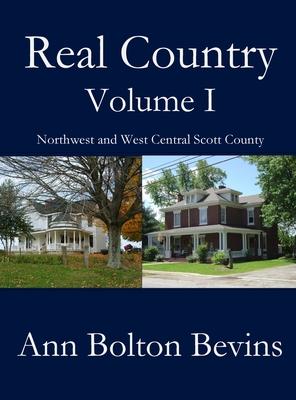Real Country is an amazing gift to all Scott Countians from Ann Bolton Bevins, widely accepted as the area's foremost authority on local history and architecture, as well as the genealogy of those who built, occupied, and authored the history which she chronicles.
It is a monumental four volume work based on extensive research and accompanied by her photography, which greatly enhances her work.
For the reader unfamiliar with Mrs. Bevins's work, some background might be helpful. For many years Scott County lacked a comprehensive and truly authoritative history. Through inclusion in statewide encyclopedic or textbook-style volumes, one could piece together basic information, and with some effort and a visit to the courthouse or public library, one could flesh out an "armchair" or casual historian's understanding. But for the most part, all the elements that bring history to life were lacking or were so piece meal as to be a daunting undertaking. In 1981 with the publication of A History of Scott County As Told By Selected Buildings, Ann began to fill that void and turn things around, making history exciting, personal, and interesting to both the casual and accomplished historian.
Based on her beliefs that old houses as well as religious, industrial, and commercial buildings have a way of communicating with us, and coupled with intensive research, utilizing all types of public records such as deeds and wills, as well as private sources such as letters, diaries, and interviews with family members and other historians, combined with a deep appreciation and understanding of human nature, Mrs. Bevins compiled the most comprehensive record to date of the life and times of Georgetown and Scott County throughout its history. Now, almost twenty-five years later, she has surpassed her earlier success to include all of rural Scott County - a work so massive as to require a multi-volume presentation with each volume dedicated to the unique features of the roughly four quadrants of the area.
Volume I covers the northwest and north central areas of Scott County, with special attention to agricultural influences, African American communities, crossroads communities, and the City of Stamping Ground, encompassing a huge and extremely varied area.
In each volume the author covers all accessible public roads and explores as many of the architectural treasures as possible. Special attention is also paid to the influences that determined early and later development and to the churches and gathering places where the exchange of ideas and commerce defines the areas' unique features. In her analysis of each of the selected properties, Mrs. Bevins incorporates criteria established by the National Register of Historic places, which includes elements such as location, topography/setting, design, materials, workmanship, and overall effect.
Because Scott County is the fastest growing county in the state and because new influences and trends are appearing in the tide of history, it is essential for Scott County to evaluate its commitment to preservation whenever possible. In the years since 1981, many buildings both sound and diminished have become endangered or have disappeared entirely, and the rural landscape has changed dramatically. Real Country is a clarion call for commitment to preserving Scott County's heritage at least as it currently exists. More than anything, however, it is a gift of love and appreciation for the area and for its people, past, present, and future.
